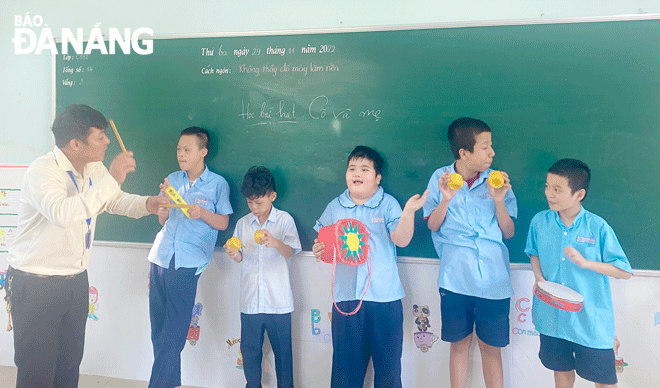Healing power of music targets children with disabilities
“Music can nourish each person's emotions, help spread joy and dispel sadness. For children with disabilities, music is a safe therapy to heal their souls, an opportunity for them to express themselves and integrate into life.”, Mr. Le Quang Hai, 34, a music teacher at Campus 2 of the ‘Tuong lai’ (Future) school for the Disabled nestled in Cam Le District, said why he applied to be a teacher at this special school.
 |
| Teacher Le Quang Hai (right) instructs children with disabilities how to use each instrument created by himself. Photo: T.P |
Approach to disabled children with love
Having graduating from the Hue College of Music Education in 2010, Le Quang Hai worked for the culture and arts department of an enterprise. In early 2013, he read the news on recruitment advertisement offered by the Future school so he immediately applied for the job post as the music teacher.
“The pupils at the school have disabilities and diseases such as dumb, deaf, down, autism and hyperactivity. Some are 14 or 15 years old, but they can't control their behavior ..." , said Hai.
At a music class taught by Hai is offended extremely bustling with lyrics and sounds of musical instruments. Suddenly, some children run out of class, others hit the table or burst into tears, and all of which happened for no reason at all. As he was familiar with the children's actions, Mr. Hai kindly coaxed and gently advised them to stabilize their psychology. “That's also part of the reason I was shocked when
I first started working, but now that I'm used to it, I feel even more sorry for them, so I'm determined to stick with them for the rest of my life. Hopefully, through music, I can help them heal their soul wounds, create confidence and motivate them to rise up”, said Hai.
Music therapy for disabled souls
According to Mr. Hai, the way to teach children with disabilities is also different from normal teaching because of the different learning abilities of the children. “If a song is studied in an outside school for only one period and a review period, students already know the lyrics and melodies. For the children here, they have to teach over and over again until they can sing. I just hope they are always happy and comfortable. Every day going to school is a happy day”, Mr. Hai shared.
In the process of teaching, Mr. Hai created many unique and easy-to-use musical instruments for students with disabilities such as taking two smooth bamboo sticks as beat bars and cutting beer cans in half, putting small pebbles and then reattached them to form musical instruments for the children.
The dedicate teacher also collects pictures of movements such as clapping hands, patting shoulders, slapping belly so that the children can imitate and follow the accompaniments for each song. Such creations make Hai's music class more attractive to students.
Asked why he like Hai's music class, although he did not speak clearly, pupil Hai Dang smiled and replied immediately: "I like teacher Hai's class time very much. When I study music, I feel happy, I get to sing a lot”.
For nearly 10 years of working at the special school, Hai has helped many children have their souls healed and more stable. The case of pupil Nguyen Duc Minh Khang is a typical example. Khang has mild autism and his hands are very weak. Hai tried to guide the disabled pupil how to play the keys on the organ, from which he discovered that Khang has a talent and passion for music.
After 2 years of practice, Khang’s hands are now firmer and more flexible and he can also play dozens of songs with many difficult ones. “When they are exposed to music, they seem to forget who they are, the podium in the classroom is a miniature stage, they are free to sing and express their emotions. Through music therapy, the children's psychology has changed markedly, being bolder, more open, happier and more sociable”, affirmed Hai.
The greatest joy of a music teacher for children with disabilities is very simple. Every time it's a holiday or New Year, at school, there is a cultural event. Just seeing the students confidently come on stage with bright smiles, sing songs or make accompaniment movements, the male teacher feels very happy.
“Now, I always cherish the dream of how to form a children's group consisting of one or two main vocalists, one guitarist and one drummer by the children with disabilities”, said Hai.
The Principal of the Future school Nguyen Duy Quy commented that through Hai's music education activities, the school's students who are children with disabilities have significantly developed communication, social interaction and cognitive skills, along with motor and sensory development. This help the disadvantaged children be more connected and sociable, an opportunity for children to express themselves and integrate into society.
Reporting by THANH PHUONG - Translating by A.THU